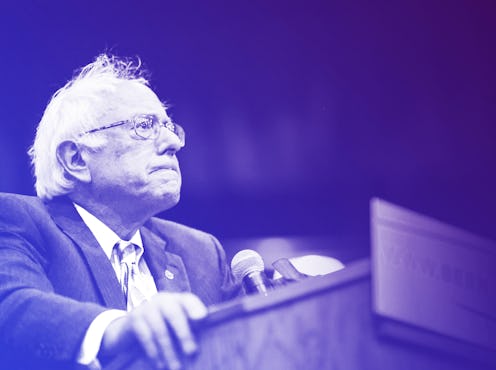News
Why Bernie Sanders Supporters Shouldn't Worry

It's more than understandable for Bernie Sanders' supporters to feel despondent, even if their candidate is still technically in the race. The Vermont senator led a wildly inspiring campaign that gave hope and energy to so many Americans who had lost faith in our political system — and witnessing Hillary Clinton cross the delegate threshold for the Democratic nomination may very well have sent many of them back to a mix of apathy and anger towards the government. The New York Times reported Tuesday night that Sanders' campaign plans to lay off half of its staff by the next day.
But even though feelers of the Bern may not be in the most festive of moods right now, they shouldn't despair, at least for one big reason. For someone who didn't actually get the party's nomination, Sanders has had an unprecedented influence on the party. His ideas and policies will leave an indelible mark on Clinton's campaign that will almost certainly carry through until the general election and the next four years — and possibly well beyond.
Before getting to Sanders' mark on Clinton and the Democratic party, though, it's important to note the general hope Sanders has given to future underdog candidates. Sanders' defied pretty much every pundit and politician by leading a competitive campaign that has lasted through June. There isn't enough room to list all who thought Sanders was, at best a protest candidate. Back in June of 2015, an NBC/ Wall Street Journal found Clinton beating Sanders by a gargantuan 60 points. In an article published June 9, 2015, Philip Bump wrote in the Washington Post about how Sanders had pretty much no shot of winning New Hampshire. Bump added a charming concession update on February 9, 2016: "Oops." Even as he made gains last year, most were quick to say he wasn't "actually threatening" Clinton, as Matthew Dickinson noted at U.S. News. That Sanders has been so successful with a grassroots campaign and an unwillingness to play traditional politics will give hope to outsider candidates for years to come.
But Sanders has changed the Clinton campaign and the Democratic party — and that won't be erased even when he's no longer in the running for the presidency. Although it is unlikely (to say the very least) that his proposal for free public college tuition would come to fruition any time soon, it has sparked an aggressive debate for how to make college more affordable. Sanders also managed to make campaign finance reform one of the most discussed topics this election and Citizens United a household name.
Once the former Secretary of State witnessed the substantial appeal of Sanders' platform she shifted left — on both a number of issues and in terms of her general political rhetoric. Although Clinton is not always clear on whether she supports raising the federal minimum wage to $15 an hour (as Sanders does), she has played up her support for the Fight for $15 campaign. The New York Times also noted in March that Clinton had shifted left on healthcare. That report quoted Democratic strategist Steve McMahon saying, “Bernie Sanders’s campaign is having an effect on Hillary Clinton’s policies.” He added, “From a progressive point of view, that’s exactly what was hoped for and that is exactly what is happening.”
Sure, there's certainly the very real risk that Clinton is playing politics and will switch once she gets the nomination. But at least until she gets to the Oval Office, Clinton doesn't really have a choice because she needs Sanders' supporters (a quarter of whom are not yet willing to vote for her in November, according to a McClatchy-Marist poll from April). Moreover, the Democratic party has seen how unexpectedly popular Sanders' message has been, and it is unlikely ignore that message. Even if Sanders' 2016 presidential campaign fades, there is a good chance that at least part of his policies and values will live on in the fabric of the party.
Image: Bustle/Caroline Wurtzel